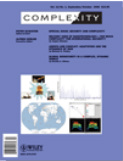Agents and conflict: Adaptation and the dynamics of war
|
Article: View here
|
Citation:
Findley, Michael G. "Agents and conflict: Adaptation and the dynamics of war." Complexity. 14 (2008): 22-35. Abstract:
Civil wars pose one of the most challenging threats to peace in the post-WWII era. The successful resolution of ongoing civil wars is particularly difficult. Parties opposing peace successfully subverted negotiated agreements in contexts as diverse as Rwanda, Northern Ireland, and Bosnia. Despite growing attention to civil wars in the empirical literature, little formal-theoretic work addresses the dynamics of civil wars. Empirical work demonstrates that the resolution of civil wars is both complex and uncertain: civil war combatants are heterogeneous in their traits, incompletely informed, and thus, boundedly rational, capable of learning from history and adapting their behavior—all hallmarks of a complex adaptive system. I employ an agent-based model, therefore, to capture these characteristics and address the conditions affecting the dynamics and evolution of civil wars. In particular, I focus on the evolutionary context of civil wars including learning and adaption and find that civil wars with adaptive combatants exhibit vastly different behavior than those without adaptive agents. Google Scholar Citations Replication Code: Email me and I'd be happy to share the code with instructions on coding protocol.
Registration: Not preregistered |
